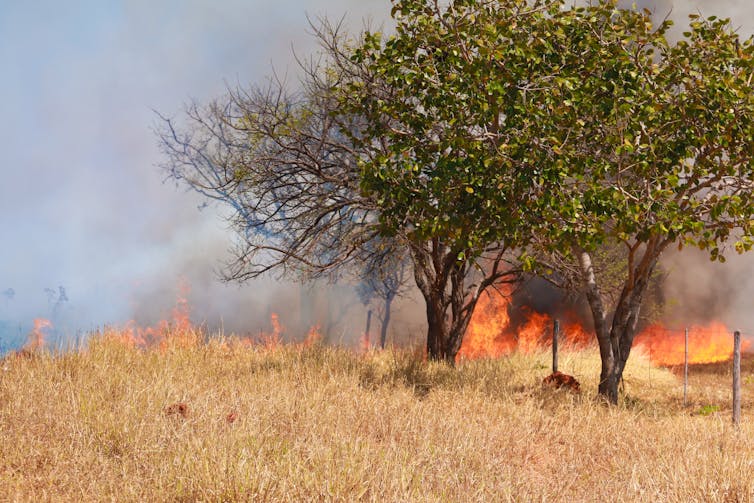[ad_1]
Huge firms may drive a worldwide shift in direction of extra sustainable provide chains that restrict injury attributable to deforestation. However progress is being slowed down by weak or non-existent commitments to make sure that provide chains for commodities reminiscent of soy, palm oil and beef haven’t contributed to tropical deforestation, based on evaluation lately printed by the environmental organisation International Cover.
Primarily based on ten years of information, the Forest 500 report assessed 350 firms, from high-street supermarkets and meals producers which may use soy or beef of their provide chains to companies utilizing tropical timber to construct furnishings. It additionally checked out 150 monetary establishments that present US$6.1 trillion (£4.8 trillion) of funding to those firms annually.
Almost one-third of the assessed firms nonetheless haven’t dedicated to avoiding deforestation when buying and selling in commodities reminiscent of beef and leather-based, palm oil, soy, timber and paper pulp.
However progress varies relying on the product. Whereas a majority (76%) of firms assessed for palm oil have a deforestation dedication, 65% of these assessed for beef don’t. Conversion to beef pasture is driving a surge in deforestation in Brazil’s Cerrado savannah the place, final 12 months, deforestation elevated by 43%.
New legal guidelines, such because the EU Deforestation Regulation and US Forest Act, goal to forestall commerce in merchandise that contribute to unlawful deforestation. However these might not shield habitats such because the Cerrado savannah, for instance, which falls out of scope of the brand new EU regulation as a result of the bushes aren’t tall sufficient to rely as forest.
Until deforestation rules are strengthened to cease commerce in merchandise which have induced the lack of any kind of significant pure habitat, firms won’t cease buying and selling in merchandise reminiscent of beef which might be sourced from forests just like the Cerrado savannah.
Within the UK, proposed rules will cease commerce in merchandise related to unlawful deforestation, however not these outlined as authorized underneath native legislation. Regulation has a component to play in halting deforestation, however provided that it consists of all conversion of pure habitats, each authorized and unlawful, and consists of regulation of the finance sector.

Sergio Willian fotos/Shutterstock
Worldwide collaborations such because the Forest and Local weather Leaders Partnership search to handle authorities and public sector ambition. However steps to scale back deforestation from throughout the personal sector are simply as essential, as a result of international commerce in forest commodities drives loss.
The best drivers of tropical forest loss are conversion to cropland and pasture, constructing of infrastructure reminiscent of mines and roads, and logging for timber. Local weather change and wildfires add additional pressures, degrading forests.
Commerce in merchandise reminiscent of coco, espresso, palm oil, soybeans, beef and leather-based, timber and wooden pulp all expose firms to deforestation threat. The uncooked commerce worth of those merchandise – outlined as “freight on board” by UN Comm Commerce – in 2022 alone was greater than US$32 billion.
It’s exhausting to maneuver away from deforestation to make invaluable merchandise when the practices are supported by big subsidies. These to the soy, palm oil and beef industries help 14% of annual international forest loss. The annual funding for forests is lower than 1% that which funds environmentally dangerous subsidies, so progress in lowering deforestation is undermined by an unlimited monetary hole. This must be closed so as to begin financially incentivising forest safety.
Human rights points and deforestation go hand-in-hand as a result of many Indigenous peoples and native communities are denied land rights to their forests. It’s vital that firms guarantee their provide chains don’t exacerbate land rights denial – however right here the brand new report highlights a world blind spot.
Only one% of Forest 500 firms had a coverage for the entire human rights points referring to at the very least one of many highest-risk commodities they had been assessed for. And many of the firms assessed (91%) didn’t have a broadcast dedication to making sure that each one rights-based conflicts are resolved earlier than they finalise new developments or acquisitions of their provide chains.
International forest targets
2023 was a landmark 12 months for the planet’s forests. For the primary time, the worldwide purpose to halt and reverse deforestation by 2030 was formally adopted by the UN.
But regardless of every little thing forests do for nature, folks and the local weather, forest loss continues virtually unabated. In 2022, an space of forest the dimensions of Denmark was misplaced. The brand new report reveals there’s nonetheless an enormous hole between ambition and motion.
There isn’t a legally binding worldwide framework conference on forests, so most forest commitments are voluntary. Recommendation to firms on find out how to speed up and scale up deforestation and conversion-free provide chains is widespread, however the Forest 500 evaluation concludes that the personal sector isn’t taking voluntary motion quick sufficient.
Solely 3% of Forest 500 firms are absolutely and publicly reporting deforestation of their provide chains, and 63% fail to publish satisfactory proof of the implementation of their deforestation commitments. This makes it tough for shoppers to ensure that the merchandise they purchase usually are not contributing to any type of forest loss.
Because the report concludes, new rules to handle deforestation should be bold and canopy each authorized and unlawful deforestation. They have to additionally deal with the conversion of pure ecosystems for forest commodities that lead to environmental destruction, and any related human rights abuses.
[ad_2]
Source link

